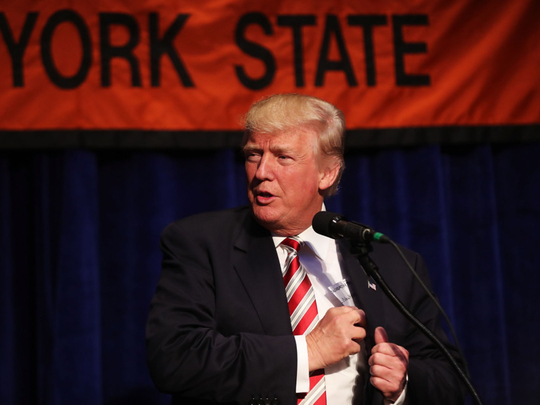
It should have been the week when both presidential candidates, the summer behind them, seized a back-to-school opportunity for a fresh start — No 2 pencils sharpened, pristine notebooks, a new backpack, a fresh chance to elevate the campaign to a level deserving of the office they aspire to. No such luck.
All hopes for a new narrative were dashed when Republican presidential candidate Donald Trump violated the vow all presidential candidates must take not to reveal anything about the classified intelligence briefings they get. It’s never been dishonoured, but at a joint “commander-in-chief forum” in New York on September 7, Trump tried to leverage his access to score some cheap political points.
His first briefing, he said, left him “shocked”, because of the information it contained about an unspecified decision by United States President Barack Obama and his former secretary of state Hillary Clinton that had led to an unspecified “total disaster”. His briefers, he said, were “not happy about” Obama’s failure to “follow what our experts” advised.
Like many other Trump assertions — Ted Cruz’s father was involved in the John F. Kennedy assassination, Muslims cheered as the World Trade Center towers fell on September 11, 2001, Obama wasn’t born in the US — this one deserves to be taken with a bucketload of salt. Trump conceded that the officials who delivered the August 17 briefing didn’t say they were displeased with the president, but he is certain that that was the message they intended him to hear. “I could tell — I’m pretty good with body language.”
Whatever actually transpired, we now know that Trump can’t be trusted not to weaponise whatever is at hand, however confidential. Doing so, former acting Central Intelligence Agency Director Michael Morell told Politico, crosses “a long-standing red line respected by Democrats and Republicans”. Former US president George W. Bush’s CIA director, Michael Hayden, said he’d never seen anything like it. “I mean, a candidate used the intelligence professionals who were briefing him in an absolutely nonpolitical setting and he imputed to them views that were politically useful to him in the moment.”
This, along with Trump’s false claim that he had always been against the Iraq War, passed right by the NBC moderator, Matt Lauer. The morning TV host got easily lost in the Republican nominee’s word salads. He failed to bring up the Donald’s shift of position that very day on military spending, when he went from supporting sequestration, which slowed spending, to pledging a huge increase of tens of billions in outlays in what is likely an effort to get votes in military-heavy, must-win states such as Virginia and Florida.
Lauer also didn’t confront Trump on some of the more glaring inconsistencies in his military agenda: That he would allow veterans to go outside the VA system for care and would cover the additional cost by eliminating that old favourite, “waste, fraud and abuse”. Then there was his earlier assertion that if women hadn’t joined the military, there would be no sexual assaults. That was an echo of his earlier advice to women that if they didn’t like being sexually harassed at work they should change jobs. This was before he hired former Fox Chairman Roger Ailes, who recently resigned in the wake of a multi-decade harassment scandal.
Not that Hillary bathed herself in glory last week, except when she batted back the ridiculous Trump claim that her coughing spell in Ohio on Labour Day indicated that she’s morbidly unhealthy. Her retort: “I’m allergic to Trump.”
Then there’s the email imbroglio that Hillary just can’t seem to put to rest, ensuring that it’ll be with us until Election Day, and perhaps beyond. Lauer asked the former secretary of state about it three times. She replied wearily, but never quite grabbed back the reins to give her strategic vision for the world. Unlike Trump, she has experience dealing with the military and veterans, but she didn’t get personal. She categorically said that no US troops would “ever” be sent to Iraq and Syria to fight Daesh (the self-proclaimed Islamic State of Iraq and the Levant), even though she certainly knows that politicians should never say “never”. When she rose from her seat, she looked like a courtroom lawyer defending a client, which she may well have been doing.
Trump smiled all the while. And he had reason to be cheerful: He encountered no challenges as he blithely threatened to remove top generals, who he said had been “reduced to rubble” by Obama; said the US should plunder the oil of the countries where it intervenes; and described Russian President Vladimir Putin as “a leader far more than our president has been”. The high praise was driven in part by the Russian president’s strength and high approval ratings, but mainly by Putin’s good judgement in calling Trump “brilliant.”
As a preview of the debates, the forum was disturbing, at least when it comes to holding the candidates’ feet to the fire. One future moderator, Chris Wallace, has said that he won’t be a “truth squad”, which is unfortunate. Corrections have to be made when the cameras are rolling, otherwise the door is open to self-serving interpretations. At a rally in Cleveland last Thursday, Trump used an “education speech” to do an instant replay of the previous night’s forum, painting Hillary as the liar and himself as the winner of every round.
Post-Labour Day, Trump had an opening to assure worried Republicans that he is prepared — or at least adequately preparing — to be president. Hillary, on a new plane with room for reporters, could have exhaustively and non-testily explained the e-mail controversy without expecting full exoneration, which will never come.
So much for that.
— Bloomberg
Margaret Carlson is a Bloomberg View columnist.










